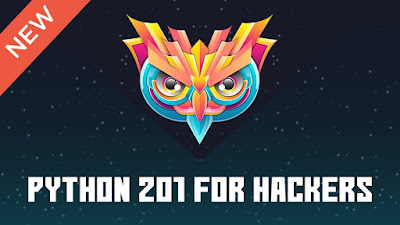Python 201 For Hackers
Course Curriculum - 7.5 Hours
The Python 201 for Hackers course builds upon the Python 101 for Hackers course by moving beyond the basics. You will learn more advanced programming concepts and techniques, with a focus on how to use and apply Python as a Windows hacking tool.
Prior Python programming knowledge is required to be successful in this course. The Python 201 for Hackers course content will not cover or explain introductory Python concepts or techniques.
Students should take this Python 201 for Hackers course if they are interested in:
- Understanding more advanced Python programming concepts such as decorators, generators, serialization and closures
- Learning how to identify and use Object Oriented Programming techniques and approaches within their Python scripts
- Building upon introductory Python 101 concepts and applying knowledge to create practical Windows hacking applications such as keyloggers, encrypted bind shells and process injectors
- Patience and a willingness to learn
- A computing environment (Windows, Linux, Mac) with at least 8GB of RAM and 20GB of disk space
- Prior virtualization (Virtual Box) knowledge preferred
- Prior Python programming knowledge (such as the syllabus covered in the Python 101 for Hackers course)
- Object Oriented Programming core concepts and Python implementations including classes, objects, methods, inheritance, encapsulation, polymorphism, operator overloading and class decorators
- How to work with and debug lower level languages (including C and assembly) and data types from within Python to interface with the official Windows API, the undocumented Windows API and the kernel via direct system calls
- Building upon standard Python functionality and leveraging modules to perform web scraping, port scanning, threading, cryptography, direct executable conversion and process creation
- How to leverage Python to extend Burp and create custom extensions, directly inject a DLL into a remote Windows process and hijack an existing thread to directly execute in-memory shellcode
Requirements
What will I learn?
The following concepts will be taught in this course:
- - Object Oriented Programming core concepts and Python implementations including classes, objects, methods, inheritance, encapsulation, polymorphism, operator overloading and class decorators
- - How to work with and debug lower level languages (including C and assembly) and data types from within Python to interface with the official Windows API, the undocumented Windows API and the kernel via direct system calls
- - Building upon standard Python functionality and leveraging modules to perform web scraping, port scanning, threading, cryptography, direct executable conversion and process creation
- - How to leverage Python to extend Burp and create custom extensions, directly inject a DLL into a remote Windows process and hijack an existing thread to directly execute in-memory shellcode




